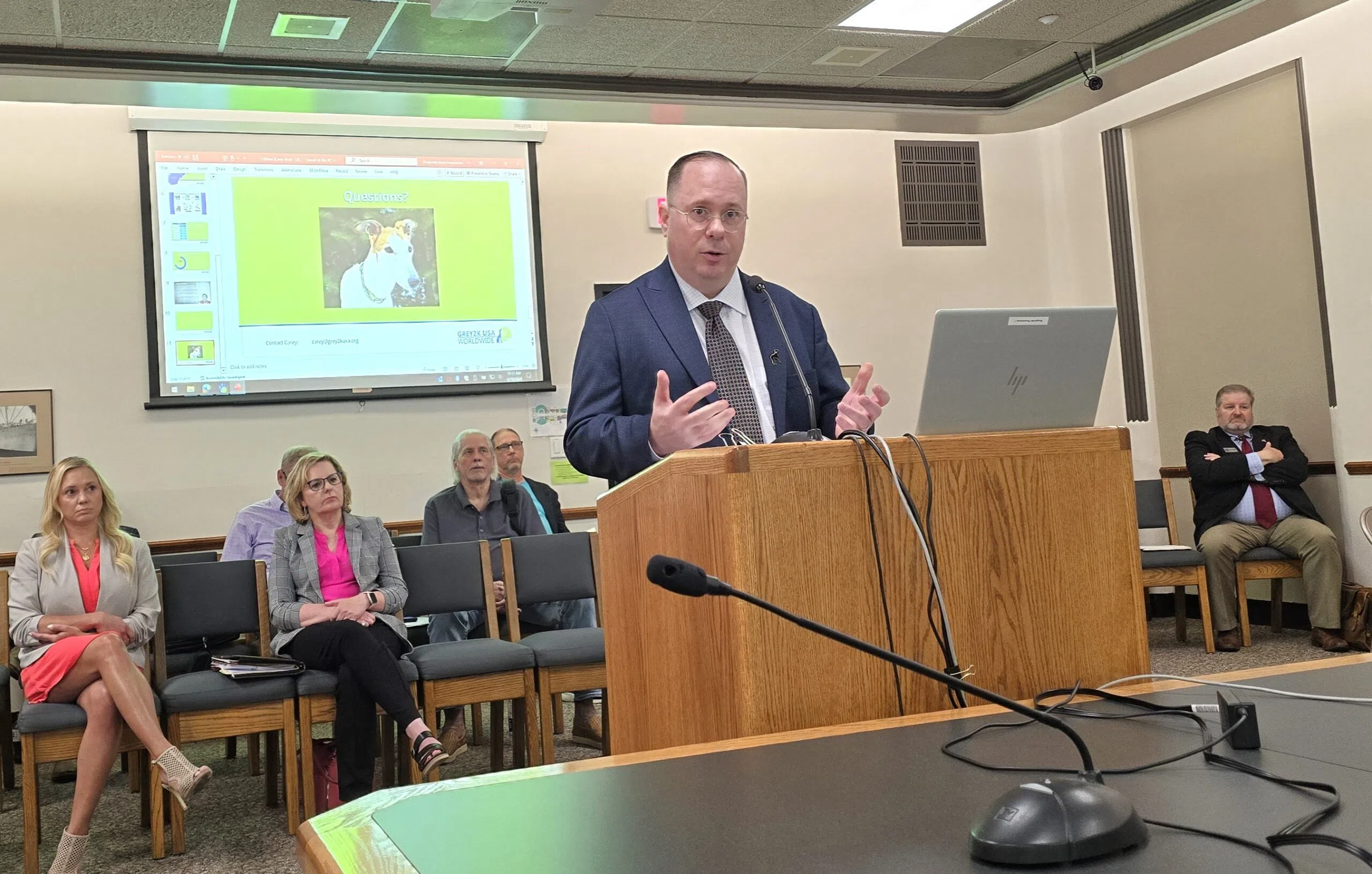
Carey Theil, executive director for GREY2K USA Worldwide, delivers remarks to the Judiciary Committee on June 19, 2024. (Michael Achterling/North Dakota Monitor)
BY: MICHAEL ACHTERLING
BISMARCK, N.D. (North Dakota Monitor) – A national greyhound advocacy nonprofit is urging North Dakota lawmakers to eliminate betting on remote, out-of-state dog races.
North Dakota and Oregon are the only two states that allow gambling companies to process advance-deposit wagering (ADW) bets on greyhound racing, making North Dakota a “hub” for online dog race wagering, said Carey Theil, executive director for GREY2K USA Worldwide.
“Live greyhound racing is not legal in North Dakota, so I do think it’s odd that this is happening,” Theil told members of the Judiciary Committee Wednesday. “A lot of the betting that is going through both Oregon and North Dakota is actually foreign dog tracks … not even in the U.S.”
There are only two remaining live greyhound race tracks operating in the U.S., both in West Virginia.
“There is about $350 million bet each year, that’s what’s left of the industry,” he said. “At its peak in the early 1990s, there was about $3.5 billion wagered, so we’ve essentially seen a massive decline.”
Live greyhound racing is illegal in 43 states, according to the group’s website. Theil raised concerns about the treatment of dogs, particularly at foreign dog tracks. He cited reports of animals being stacked in crates for up to 23 hours per day, an increased risk of broken legs and risk of electrocution if they catch a motorized lure.
Theil also said the Oregon Racing Commission funded a study on greyhound racing in 2023 that showed of the more than 6,000 greyhound race starts on U.S. tracks, more than 550 dogs were injured.
Bruce Johnson, executive director for the North Dakota Racing Commission, warned lawmakers that outlawing betting on greyhound racing could lead to a push to eliminate horse racing. North Dakota has horse racing tracks in Fargo and Belcourt.
“I just think that’s going to be a logical progression, I really do,” Johnson said. “If this group, and (Theil), get their foot in the door, who knows what’s next? It’s just an opening that I don’t think the state of North Dakota should allow.”
Theil said his organization does not have a position on horse racing. He said greyhound racing has been resistant to change and does not have the same level of regulation or protection of animals as horse racing.
During the 2022-23 fiscal year, $60.7 million in greyhound racing bets were processed in North Dakota, according to information the Racing Commission provided to GREY2K USA Worldwide. Those bets generated about $145,000 in tax revenue for the state, split among five different state funds.
“We certainly do not view that as a significant revenue source for the state,” Theil said.
In response to questions from Rep. Pat Heinert, R-Bismarck, Johnson said less than 1% of bets placed on greyhound racing were from North Dakota residents.
In an interview with the North Dakota Monitor, Heinert said he questions whether it’s worth it to continue allowing betting on remote greyhound racing given the small number of North Dakotans participating and the amount of money the state receives in tax revenue.
“It just doesn’t seem like it’s right anymore,” Heinert said.
Sen. Janne Myrdal, R-Edinburg, chair of the Judiciary Committee, said she wasn’t aware North Dakota was a hub for online racing transactions before the presentations to the committee on Wednesday.
“To find out we’re a hub for whatever little money it is, it’s something North Dakotans, I believe, would want to know … we’re a go-through channel for greyhound racing around the world,” Myrdal said. “In our state, we have animal cruelty laws on the books here, but allowing greyhound racing to be channeled … portaled in our state that has taxpayers funding, is completely unethical to me because we don’t have animal cruelty control over those dogs somewhere.”
She said the committee will not advance a bill on the issue to the full Legislature because the topic falls outside of the Judiciary Committee’s purview. However, she wanted the comments and presentations to be part of the committee’s study on the racing industry as a whole.
Myrdal said individual lawmakers may draft their own bills for introduction to the legislative session.




Comments